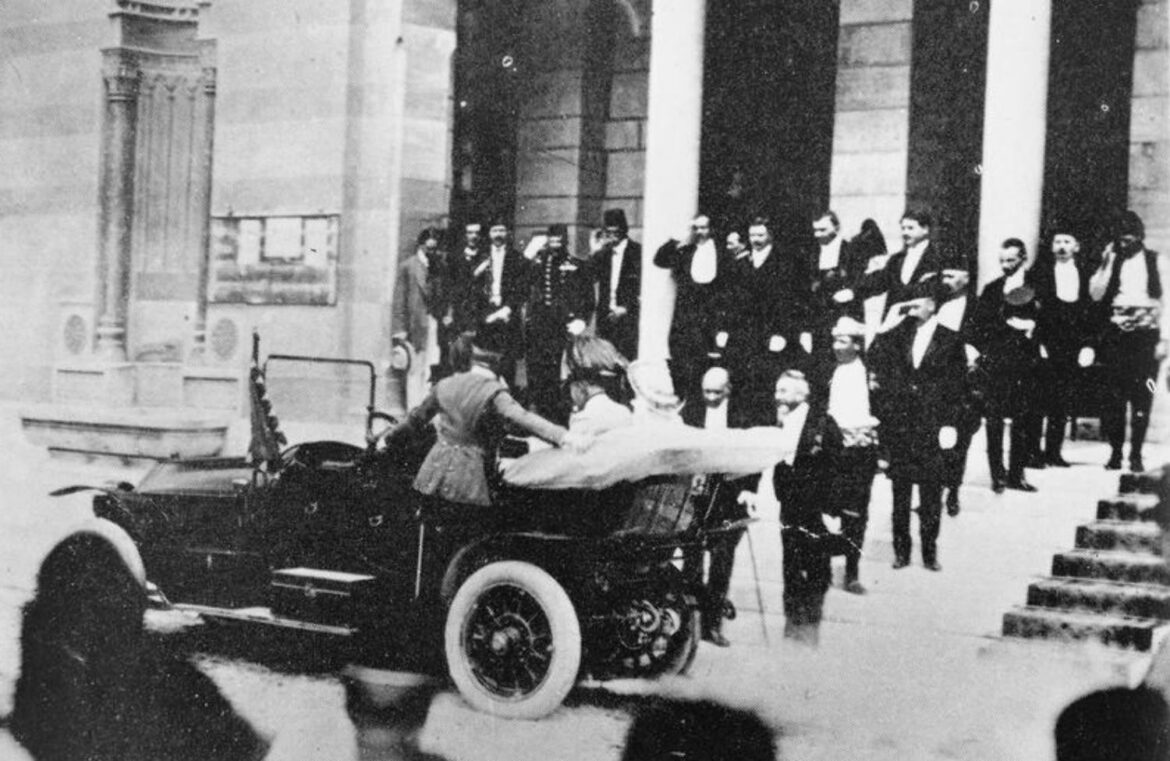History is often shaped not by massive empires or sweeping ideologies, but by singular moments — a shot fired, a word spoken, a decision made. Few moments illustrate this truth better than the assassination of Archduke Franz Ferdinand, an event that set in motion the deadliest conflict the world had ever known: World War I. What seemed like a localized political killing became the spark that ignited a war involving nations across Europe and beyond, changing global politics, society, and warfare forever.
The Man Behind the Title
Archduke Franz Ferdinand was the heir presumptive to the Austro-Hungarian throne, born on December 18, 1863, in Graz, Austria. As the nephew of Emperor Franz Joseph, his life was one of privilege, responsibility, and preparation for future rule. Known for his intelligence and strong opinions, Franz Ferdinand envisioned modernizing the Austro-Hungarian Empire by giving greater autonomy to its many ethnic groups — including Czechs, Slovaks, Croats, and Serbs.
However, his progressive ideas made him unpopular among conservative elements of the empire and within the military establishment. His marriage to Countess Sophie Chotek, a woman of lower nobility, also created scandal at court. Despite these challenges, the Archduke remained committed to reforming the dual monarchy into a more inclusive federation — a vision that might have changed European history had it not been cut short.
The Political Powder Keg of Europe
In the early 20th century, Europe was a continent on edge. Nationalism, imperialism, and a complex system of alliances had turned it into a political powder keg waiting to explode. The Austro-Hungarian Empire was a multi-ethnic entity struggling to hold together a mosaic of national identities.
Meanwhile, neighboring Serbia had emerged as a center of Slavic nationalism, advocating for the unification of all South Slavs — many of whom lived under Austro-Hungarian rule. Tensions between Vienna and Belgrade were high, and the assassination of the empire’s heir apparent would provide the perfect excuse for confrontation.
Across the continent, major powers were also entangled in alliances that promised mutual defense. Germany stood behind Austria-Hungary, while Russia supported Serbia. France and Britain, in turn, were aligned with Russia. This web of commitments ensured that any regional conflict could easily escalate into a world war — and that is exactly what happened.
The Road to Sarajevo
In June 1914, Archduke Franz Ferdinand and his wife Sophie traveled to Sarajevo, the capital of Bosnia — a province recently annexed by Austria-Hungary but still home to many ethnic Serbs. The trip was meant to demonstrate imperial unity and strength. However, it was viewed by Serbian nationalists as a provocation.
Among those who opposed Austro-Hungarian rule was a secret nationalist organization known as the Black Hand, which sought to unite all South Slavs under Serbian leadership. Members of this group plotted to assassinate the Archduke during his visit.
The Assassination
On June 28, 1914, the couple’s motorcade made its way through Sarajevo’s streets. The morning began with an unsuccessful bomb attempt by one of the conspirators, which wounded several officers but left Franz Ferdinand unharmed. Despite this, the Archduke insisted on continuing his schedule — a decision that would prove fatal.
Later that morning, as the motorcade took a wrong turn, another conspirator, Gavrilo Princip, happened to be nearby. Seeing his chance, he stepped forward and fired two shots at close range. One bullet struck Sophie, and the other hit Franz Ferdinand. Within minutes, both were dead.
The assassination shocked Europe. The date — June 28 — also carried symbolic meaning: it was Vidovdan, an important Serbian national holiday commemorating the 1389 Battle of Kosovo. To Serbian nationalists, the act was one of defiance; to Austria-Hungary, it was an intolerable insult demanding retribution.
The Domino Effect: From Sarajevo to Global War
The assassination was the spark that set the world ablaze. Austria-Hungary, with Germany’s backing, issued an ultimatum to Serbia with harsh demands designed to be rejected. When Serbia accepted most but not all of them, Austria-Hungary declared war on July 28, 1914 — exactly one month after the assassination.
Russia, bound by Slavic ties and its alliance with Serbia, began mobilizing its forces. Germany declared war on Russia, followed by France and Britain joining the conflict. Within weeks, Europe was engulfed in war.
What began as a local crisis in the Balkans became a global catastrophe — the First World War, involving more than 30 nations and leading to the deaths of over 16 million people.
The Role of Nationalism and Miscalculation
The assassination of Archduke Franz Ferdinand did not cause the war on its own; rather, it triggered underlying tensions that had been building for decades. Nationalism was tearing empires apart, militarism encouraged nations to rely on armed force, and imperial ambitions drove competition for colonies.
European leaders believed that war could be short and decisive, a dangerous miscalculation that resulted in four years of trench warfare, mass destruction, and political upheaval. The balance of power that had held Europe together for a century since the Napoleonic Wars collapsed in just a few months.
The Legacy of Franz Ferdinand
Ironically, Franz Ferdinand himself had been one of the few Austro-Hungarian leaders who opposed war with Serbia. His vision for reform — granting more autonomy to different ethnic groups — might have stabilized the empire and prevented the disintegration that followed.
After the war, the Austro-Hungarian Empire ceased to exist. New nations such as Czechoslovakia, Yugoslavia, and Hungary emerged from its ruins. The political order of Europe was forever transformed, setting the stage for new conflicts and eventually World War II.
Gavrilo Princip and the Symbol of Rebellion
Gavrilo Princip, the young Bosnian Serb who fired the fatal shots, became a controversial figure. To some, especially in Serbia, he was a nationalist hero who struck a blow against imperial oppression. To others, he was a terrorist whose act of violence unleashed a global tragedy.
Princip was captured shortly after the assassination. Too young for the death penalty, he was sentenced to 20 years in prison, where he died of tuberculosis in 1918 — the same year the war he helped spark finally ended.
The World After the Archduke
The assassination of Franz Ferdinand was more than a single tragic event — it was a turning point in human history. The war it triggered dismantled empires, redrew borders, and changed political ideologies. Monarchies that had ruled for centuries crumbled, while new ideologies like communism and fascism emerged from the ashes.
The aftermath of World War I also laid the groundwork for World War II. The Treaty of Versailles humiliated Germany, creating economic hardship and resentment that would later fuel Adolf Hitler’s rise to power. Thus, the bullet fired in Sarajevo not only ended one man’s life but indirectly shaped the course of the 20th century.
Lessons from History
The assassination of Archduke Franz Ferdinand teaches us how fragile peace can be when nations allow pride, nationalism, and militarism to outweigh diplomacy and understanding. It underscores the importance of dialogue, empathy, and restraint in international relations — lessons that remain vital today.
It also reminds us that behind every major historical event are individuals whose choices, however small, can alter the fate of nations. A single act of violence by a young man in Sarajevo cascaded into a war that reshaped the world.
Conclusion
The story of Archduke Franz Ferdinand is not merely about one man’s death — it is about the fragility of peace and the power of cause and effect in history. His assassination transformed the modern world, proving that even the smallest spark can ignite an inferno when fueled by hatred, fear, and ambition.
More than a century later, the echoes of Sarajevo still remind us that the preservation of peace requires vigilance, humility, and the courage to understand one another — before history repeats itself.




